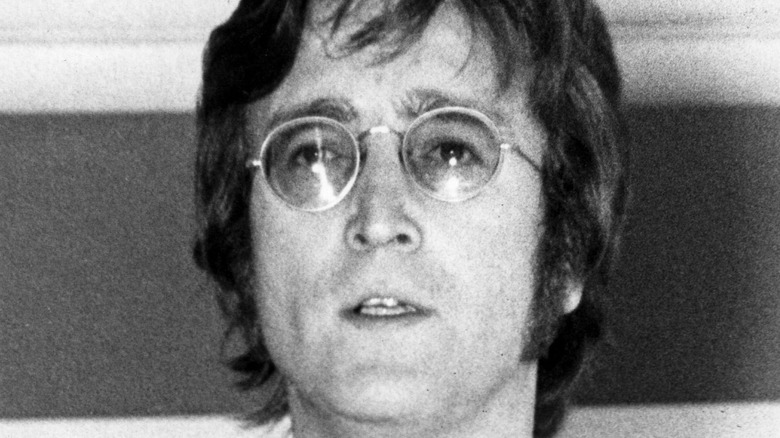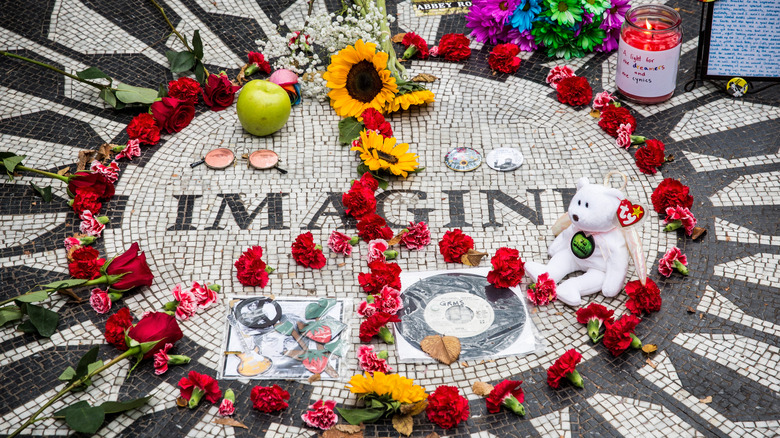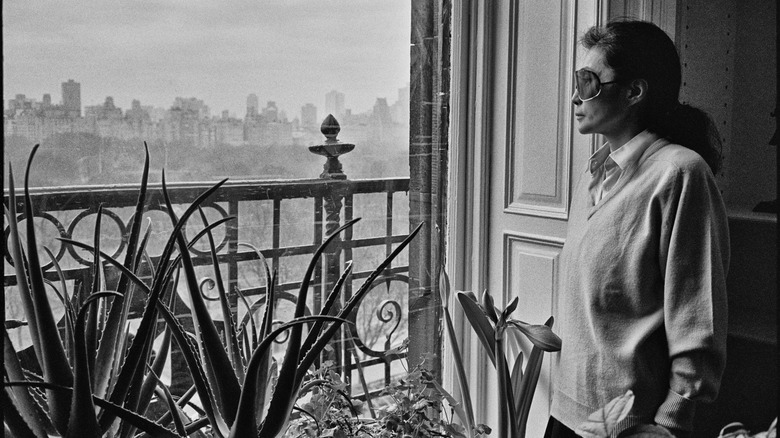The John Lennon Theory That Changes Everything
Most of us are familiar with the tragic and shocking circumstances around the death of John Lennon. In 1980, the ex-Beatle who had stepped away from his solo career was back in the limelight for the first time in five years, making public appearances and writing, recording, and releasing new material. But Lennon was shot and killed outside his New York apartment by Mark Chapman — who had stalked the singer for three days — on December 8 of that year. Lennon's wife, the artist Yoko Ono, was with him at the time of the attack.
According to Metro, Chapman waited at the scene of the crime for the police to arrest him, reading a copy of J. D. Salinger's "The Catcher In The Rye" as he did so. He later pleaded guilty to second-degree murder and received a 20-year-to-life sentence. Chillingly, Chapman was a fan of Lennon's music and had just hours before approached the singer to sign of copy of his album with Ono, "Double Fantasy." Per Newsweek, a motive for the attack was difficult for most people to comprehend, but though Chapman was cryptic during his trial and unwilling to talk to the press, subsequent investigative journalism suggested that the killer had targetted Lennon for religiously-motivated reasons. In particular, he was allegedly still enraged by the singer's comments about Christianity while a member of The Beatles. Chapman's wife also said the killer saw Lennon as a hypocrite who would "preach love and peace but yet have millions."
Was Mark Chapman a CIA assassin?
Not everyone is convinced that Mark Chapman murdered John Lennon as a result of an unhinged sense of religious justice; some suggest that the killing was, in fact, a coordinated assassination undertaken at the behest of the U.S. government.
As discussed in a Patch interview with John Potash — the producer of the documentary "Drugs As Weapons Against Us: The CIA War on Musicians and Activists" — writers such as British journalist and former lawyer Fenton Bresler and Professor Peter Dale Scott argued that the CIA used "behavior modification" techniques in the form of "hypnosis and drugs" to turn Chapman into an unwitting political assassin. This allegedly happened at a time when Lennon was beginning once again to give voice to his leftwing politics after a period away from the public eye.
Potash claims that Lennon was previously targeted by the CIA's MK-Ultra program, and the agency triggered his drug use so that he had "a hard time performing publicly when he had become most radical, in the early 1970s ... acid contributed to his intense panic attacks before performances. Lennon talked about this in interviews I found. By the late 1970s, he'd mostly sobered up, getting back into activism ... and he was about to get his full American citizenship." Potash pins this purported plot to the timing of the murder.
It is true that certain agencies did consider Lennon a political radical, with the FBI keeping detailed files on his movements and activism. But though the rumor that Chapman may have been motivated to kill Lennon by the CIA persists, it remains a fringe conspiracy theory.
Mark Chapman's later confession
John Lennon's murderer, Mark Chapman, has been eligible for parole 11 times, but each time was opposed in his appeal by Lennon's widow, Yoko Ono (pictured above, a year after his death). Ono told The Daily Beast that she lives in fear of the killer's release and is still traumatized by the idea that she — who stood beside Lennon at the time of the shooting — might have been murdered too, leaving their young son, Sean, an orphan. Per the same source, Chapman and his wife have repeatedly attempted to contact Ono to ask her forgiveness.
More recently, Chapman's appeals have centered around projecting a sense of contrition, which conflicts with earlier assessments of his motives that suggest he struck to gain fame or notoriety rather than out of a sense of ill-feeling towards the musician he both admired and resented. "I didn't kill [Lennon] because of his character or the kind of man he was. He was a family man. He was an icon," Chapman told the parole board, according to Metro. "I assassinated him ... because he was very, very, very famous and that's the only reason, and I was very, very, very, very much seeking self-glory, very selfish ... I'm sorry for the pain that I caused to [Yoko Ono]. I think about it all of the time."
Nevertheless, Chapman has repeatedly failed to convince his parole boards that he is ready to be released.


